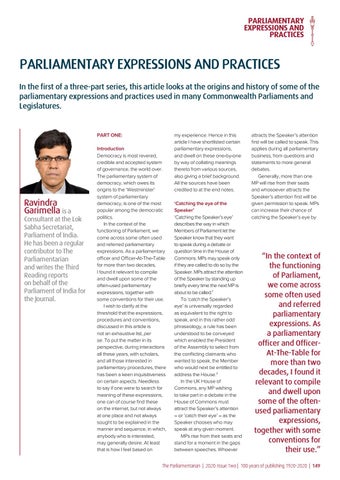PARLIAMENTARY EXPRESSIONS AND PRACTICES
PARLIAMENTARY EXPRESSIONS AND PRACTICES In the first of a three-part series, this article looks at the origins and history of some of the parliamentary expressions and practices used in many Commonwealth Parliaments and Legislatures.
PART ONE:
Ravindra Garimella is a
Consultant at the Lok Sabha Secretariat, Parliament of India. He has been a regular contributor to The Parliamentarian and writes the Third Reading reports on behalf of the Parliament of India for the Journal.
Introduction Democracy is most revered, credible and accepted system of governance, the world over. The parliamentary system of democracy, which owes its origins to the ‘Westminster’ system of parliamentary democracy, is one of the most popular among the democratic politics. In the context of the functioning of Parliament, we come across some often used and referred parliamentary expressions. As a parliamentary officer and Officer-At-The-Table for more than two decades, I found it relevant to compile and dwell upon some of the often-used parliamentary expressions, together with some conventions for their use. I wish to clarify at the threshold that the expressions, procedures and conventions, discussed in this article is not an exhaustive list, per se. To put the matter in its perspective, during interactions all these years, with scholars, and all those interested in parliamentary procedures, there has been a keen inquisitiveness on certain aspects. Needless to say if one were to search for meaning of these expressions, one can of course find these on the internet, but not always at one place and not always sought to be explained in the manner and sequence, in which, anybody who is interested, may generally desire. At least that is how I feel based on
my experience. Hence in this article I have shortlisted certain parliamentary expressions, and dwell on these one-by-one by way of collating meanings thereto from various sources, also giving a brief background. All the sources have been credited to at the end notes. ‘Catching the eye of the Speaker’ ‘Catching the Speaker’s eye’ describes the way in which Members of Parliament let the Speaker know that they want to speak during a debate or question time in the House of Commons. MPs may speak only if they are called to do so by the Speaker. MPs attract the attention of the Speaker by standing up briefly every time the next MP is about to be called.1 To ‘catch the Speaker’s eye’ is universally regarded as equivalent to the right to speak, and in this rather odd phraseology, a rule has been understood to be conveyed which enabled the President of the Assembly to select from the conflicting claimants who wanted to speak, the Member who would next be entitled to address the House.2 In the UK House of Commons, any MP wishing to take part in a debate in the House of Commons must attract the Speaker’s attention – or ‘catch their eye’ – as the Speaker chooses who may speak at any given moment. MPs rise from their seats and stand for a moment in the gaps between speeches. Whoever
attracts the Speaker’s attention first will be called to speak. This applies during all parliamentary business, from questions and statements to more general debates. Generally, more than one MP will rise from their seats and whosoever attracts the Speaker’s attention first will be given permission to speak. MPs can increase their chance of catching the Speaker’s eye by
“In the context of the functioning of Parliament, we come across some often used and referred parliamentary expressions. As a parliamentary officer and OfficerAt-The-Table for more than two decades, I found it relevant to compile and dwell upon some of the oftenused parliamentary expressions, together with some conventions for their use.”
The Parliamentarian | 2020: Issue Two | 100 years of publishing 1920-2020 | 149




